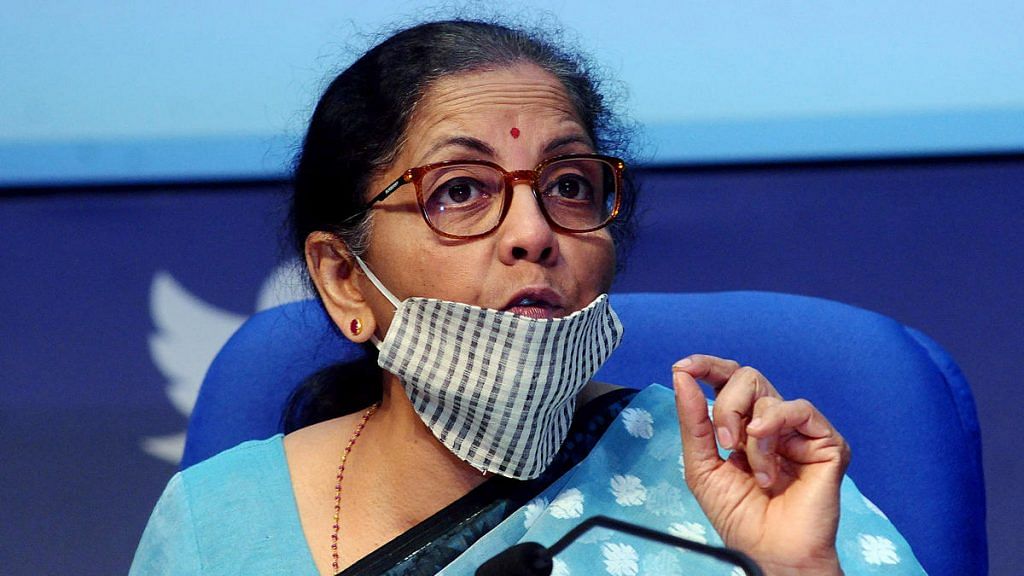New Delhi: When Finance Minister Nirmala Sitharaman rolled out the Narendra Modi government’s plan to make India self-reliant on 13 May, she seemed to have taken a leaf out of the study, Third Way, considered the gospel of “swadeshi” economics.
The author of Third Way, Dattopant Thengadi, an ideological stalwart of the Rashtriya Swayamsevak Sangh (RSS), had propounded swadeshi economics in a series of essays in the 1990s. They detailed the conceptual framework of a ‘self-reliant’ India.
For those affiliated to the RSS, when it comes to making India ‘self-reliant’, Thengadi’s Third Way and economist M.G. Bokare’s Hindu Economics are the major reference points. Both studies spell out the finer details of the swadeshi school of economics and the model of ‘self-reliant’ India .
The influence of Third Way can be gauged from the fact that the finance minister, while referring to Prime Minister Narendra Modi’s address on 12 May, said, “When the Prime Minister said self-reliant India, he didn’t mean India to be in an isolation.”
Thengadi had spelt this out in the Third Way.
“Swadeshi is the outward, practical manifestation of patriotism. Patriotism is not considered as isolationism… Patriots are not against internationalism,” he had written. “Their pleas for national self-reliance are not incompatible with international co-operation, provided that latter is on equal footing-with due regard to the national respect of every country.”
Also read: ‘Endorsing terror’: Open letter by ex-servicemen, V-Cs slams Pulitzer to J&K photojournalists
The swadeshi model
In this treatise, Thengadi’s main premise was that neither capitalism nor socialism can be a solution for India. There has to be a ‘swadeshi’ model with a ‘self-reliant’ India — an India-specific model he called the ‘Third Way’.
“Proponents of swadeshi are not prepared to endorse the view that the western paradigm is the universal model of progress and development worthy of being followed by all the people of the world,” he wrote. “People have their own distinct culture and the model of progress and development for each country should be consistent with its own cultural ethos. Westernisation is not modernisation.”
One of his key arguments was against the free trade theory preached by Adam Smith and then established firmly by Ricardo’s Principle of Political Economy’ in 1817.
Thengadi, after doing a detailed comparative study of various economic models, had observed that the free trade theory is no more applicable in the present world and India should become self-reliant.
He founded the Swadeshi Jagaran Manch (SJM) in the 1990s to push the debate on the ‘swadeshi model’ and also launched India’s biggest labour organisation, the Bharatiya Mazdoor Sangh, in addition to an all-India farmers’ collective, the Bharatiya Kisan Sangh. Incidentally, Thengadi’s birth centenary also falls this year.
Bokare, the former Nagpur University vice-chancellor and members of several top economic advisory bodies at the Centre as well as in the state of Maharashtra, buttressed Thengadi’s arguments further.
Bokare’s seminal work Hindu Economics: Eternal Economic Order, published in 1993, argued that the western paradigm had failed and India could find a solution to its problems in its ancient scriptures.
Bokare was interestingly a Marxist economist for a long time. He was also a friend of Thengadi even though they stood at the opposite ends of the ideological spectrum. It was Thengadi who encouraged and motivated Bokare to study ancient Indian scriptures for economic thought and concepts.
“Dr Bokare had been a confirmed Marxist for decades. In his enthusiasm for party propaganda, he often converted his class into a recruiting ground for the Communist party,” Thengadi wrote in the preface to Hindu Economics. “The intellectual honesty of Dr Bokare inspired him to study in depth.. The Gandhian economics and finally Hindu Shastras also.. In 1984, he predicted the collapse of communism; in 1992 he declared that Hindu economics is the economics of the future.”
Also read: RSS calls for new ‘Swadeshi’ model of development, cautions against feeling of exclusion
The taxless budget
Bokare, who analysed all key western economic models, presented a full chapter on the possibility of ‘Tax less budget in Hindu economics’ in his treatise.
“There is an impression in Europe and America that ancient Indian did not possess any economic thoughts. This is not true… Holy Vedas have clear reference of market, supply and demand, price, trade, interest and profit and tax,” he wrote. “By interpolation we can deduce lease-rent and wages also for people without property for income. Mercantile laws governing the economies are codified.”
“Smrutis are the codification of economic activities with some measures of qualifications of the variables,” he added. “Cost of production, market price, percentage of tax, wage-rates, interest rates etc are stated in the codified smrutis. Competition and monopoly are clearly identified. Foreign trade has been explained.”
He further wrote on the theory of economics in the Vedas.
“The frightening mathematics for economics, ideologically prejudiced theorems, falsehood in the history of economic thoughts etc have manifested in a shapeless corpus of economics,” he added. “Hindu economics traces theory of economics in Holy Vedas and in the course of analytical exercises transcends western economics. It realises eternal economic order for mankind.”
Also read: Online shakhas, free ebooks, an app contest: RSS makes big web push amid lockdown
